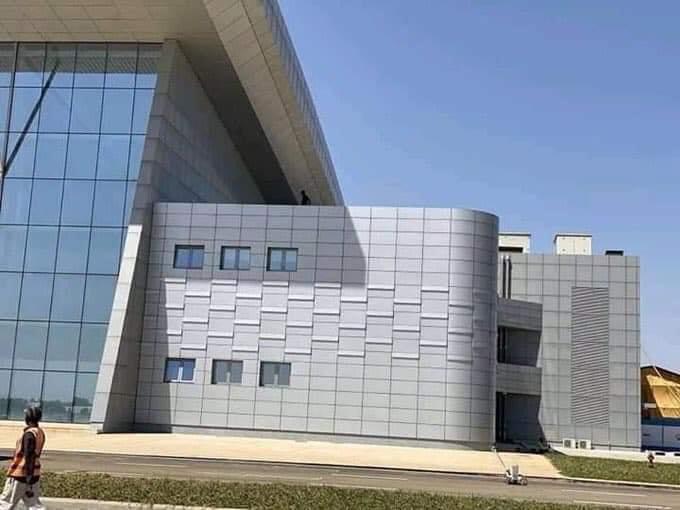
The decision by the federal government to embark on building additional terminals to its international airports some years ago was insightful as those facilities can now meet the needs of increasing passenger traffic
Many Nigerians were surprised last week when the global body, Airport Council International (ACI), African Region gave the Airport Service Quality (ASQ) 2020 award to the NnamdiAzikiwe International Airport, Abuja.
The ACI recognised the airport as the best airport in Africa because it met the requirement of processing between five and 15 million passengers per year in addition to the size of the airport.
Some Nigerians who spoke to THISDAY on the recognition by ACI expressed surprise because over the years Nigerian airports had been criticised for being dilapidated, as obsolete facilities hamper easy passenger process.
So it was like a rude awakening when it suddenly happened that in the international airports in Lagos, Abuja, Kano and Port Harcourt, the federal government was building state of the art terminals.
The terminal in Port Harcourt was the first to go on stream in 2018, followed by that of Abuja in 2019 and soon Kano and Lagos terminals would start processing passengers, according to the Federal Airports Authority of Nigeria (FAAN).
The General Manager, Corporate Affairs, FAAN, Mrs. Henrietta Yakubu, said the award represented the agency’s commitment to, “continuously improving customer experience across all our airports. The recognition comes at a time when we are geared towards ensuring seamless airport facilitation with the opening of new terminals and upgrading of our current infrastructures across board.”
She added that despite a turbulent year plagued by COVID-19 induced financial struggles; the authority has endeavored to prioritize customer satisfaction while ensuring that health and safety remain topmost.
Passenger Traffic
There has been growing air passenger traffic both for local and international travels. Considering Nigeria’s huge population, industry observers always argued that although passenger traffic is growing but not as fast as it ought to be and that is because not many Nigerians can afford to travel by air. But over the years the airport facilities have experienced passenger over capacity due to passenger growth and lack of corresponding expansion of terminal facilities.
Some of the airports affected included the ones in Lagos, Abuja, Kano, Enugu, Owerri, Port Harcourt and Benin.
FAAN started expanding terminal facilities in these airports and others and awarded the building of new terminals at the international airports in Lagos, Abuja, Enugu, Kano and Port Harcourt.
FAAN’s record of passenger traffic in the last 17 years, from 1999 to 2016, showed progressive increase of passenger traffic every year.
In 2016, total passenger traffic in all the airports managed by FAAN was 14, 361, 587, while it was slightly lower in 2017 to 13, 704, 215, it rose to 16, 371, 674 in 2018 and 17, 580, 023 in 2019.
The federal government has also projected that the major international airports: the MurtalaMuhammed International Airport (MMIA), Lagos, the NnamdiAzikiwe International Airport, Abuja, the MallamAminu Kano International Airport, Kano and the Port Harcourt International Airport, Omagwa would be processing about 55 million passengers by 2048.
This was the projection made by the Outline Business Case Report for the concession of the four major airports, titled, Nigeria Four Airports PPP and made available by the Ministry of Aviation.
The report said the forecast of total traffic for the four airports in Nigeria is expected to grow on average at 5.3 per cent over the next 30 years, from 11 million passengers in 2017 to 55 million by 2048.
The report attributed the growth to the strong population growth and affluence of this population, so government is expected to provide sufficient capacity to handle this amount of forecast traffic.
Airport Expansion
Maybe it is because of the projected increase in passenger movement that the federal government is seriously considering concession of the facilities.
The Ministry of Aviation said that in addition to the terminals that are currently under construction, if the airports are given out in concession, the concessionaires are required to refurbish the existing facilities in Abuja and Port Harcourt, adding that in Lagos a new terminal needs to be constructed and the existing MMA1 (General Aviation Terminal (GAT) international terminal decommissioned.
“The Ministry aims to develop Nigeria’s major commercial airports and surrounding communities into efficient, profitable, self-sustaining, commercial hubs which will create more jobs and develop local industries,” the report said.
It also disclosed that the federal government of Nigeria would like to use the PPP (Public, Private Partnership) model to leverage private sector participation and foreign investment to achieve the upgrade and development of new infrastructure at these airports in the fastest and most cost-effective manner.
On the scope of the project, the report said it fits well within the scope of the Ministry and the ICRC (Infrastructure Concession Regulatory Commission) and would help Nigeria to reach its objective in terms of air transport: developing and profitably managing customer-centric airport facilities for safe, secure and efficient carriage of passengers and goods at world-class standards of quality.
Taking up the Challenge
But the federal government has always had the intention to concession the airports since the last 15 years but in 2012, government decided that instead of going through the concession process, it adopted the policy of rehabilitating the airports, known as airport renewal and then signed the contract with the Chinese Exim bank to borrow money to build the new terminals at the international airport, in addition to the international terminal facility at the AkanuIbiam International Airport, which project is nearing completion.
The plan to concession the airports, which gave impetus to the report quoted above is government’s solution to obsolete airport facilities but labour unions have always descried the decision to concession the airports, alleging spurious intentions and insincerity in the concession plan and emphasised that FAAN could effectively manage the airports if given free hands by the Ministry of Aviation to do so.
Airport Certification
Progress report on the international airports started with the certification of the MurtalaMuhammed International Airport (MMIA), Lagos and the NnamdiAzikiwe International Airport, Abuja in September and November 2017 by the Nigerian Civil Aviation Authority (NCAA)
Before the certification, Airport Council International (ACI) guided by FAAN inspected the provision of facilities and equipment at the two airports in accordance to recommended practices in order to meet international standards.
It was after these conditions were met that NCAA, in accordance to the International Civil Aviation Organisation (ICAO) regulations, certified the two airports.
The certification upped the rating of the MurtalaMuhammed International Airport, Lagos and the NnamdiAzikiwe International Airport, Abuja in Africa, as the Lagos, which is the fifth busiest airport is projected to become a major hub in West and Central Africa.
With the certification of these airports, Nigeria’s rating has not only improved but these airports can serve as hubs in West and Central Africa because of the international recognition.
The then Director General of the Nigerian Civil Aviation Authority (NCAA), the late Captain Muhtar Usman, said Nigeria had become the only country in Africa to have its two airports certified in accordance to ICAO safety standard and the only country in West Africa sub-region with internationally certified airports.
The late Usman said the certification had improved the rating of the two airports in safety standards in the international aviation circles and would attract more global carriers to the country, which would boost air transport and create more jobs for the citizenry.
He hinted then that this would reposition air transport to contribute more to the GDP of the country because it would boost passenger movement in domestic and international destinations, as passenger movement was expected to double from over 15 million per annum in the next 15 years.
“It is also interesting to note that with the certification of Abuja airport, Nigeria has become the first state to achieve the certification of more than one international airport in the AFI (Africa/Indian) Region. However, we are not resting on our oars, as the certification of Kano, Port Harcourt and Enugu airports are scheduled for completion in compliance with the Abuja Ministerial declaration and safety targets of 2012,” he had said.
The then Managing Director of FAAN, Saleh Dunoma reiterated the agency’s commitment to continue with the present tempo in the development of the other international airports
“We made a commitment to continue with this tempo and soon we will go to Port Harcourt, Kano and Enugu airports,” he said.
Reacting to the rating of the Abuja airport, the former General Manager, Business Development of FAAN and currently the Managing Partner, TMSS Logistics, AlhajiNuhu Adam, told THISDAY that the award given to NnamdiAzikiwe International Airport, Abuja was a laudable one, which signifies that the airport has improved significantly and also indicates that the federal government is doing well in improving the airport facilities in Nigeria.

He said the government should go further and provide landing facilities at the airports under FAAN management so that airlines could operate into these airports late in the night, remarking that this would enable airlines to operate their airlines for longer hours, provide longer service to travellers and generate more revenue to FAAN.
He also said the FAAN should do everything possible to build website for each of its international airports so that people could access them from all over the world, noting that the international airports are only included in the website of the agency’s international airports, but each should have its own website.
“The award indicates that ACI African Region has been monitoring the improvement of the airport and kudos should go to the federal government, FAAN and the management of Abuja airport.
“The award speaks volumes on how far the airport has improved. If we can receive such respected accolade now that the airport is still work in progressive, we should expect more global recognition when the federal government must have achieved its multimodal transport system. The Abuja airport stands out in every aspect of airport development.
“However, FAAN still has a lot of work to do. Abuja airport has not been linked to its own website. In this period of information technology, the airport should be accessed by anyone who wants to know more about it from any part of the world. You can easily access the domestic airport terminal managed by Bi-Courtney Aviation Services Limited (BASL) in Lagos, known as MMA2. The Abuja airport remains our best so far,” Adam said.
Industry observers said that the award to Abuja should serve as incentive for government to sustain the tempo of infrastructural improvement of the airports so that they would meet international standards in terms of security, safety, critical facilities like toilets, Internet access and easy passenger facilitation.
Stakeholders also called on FAAN to establish elaborate transit facility at the Abuja airport to enhance regional and sub-regional flight operations, where passengers would stay and connect international flights from the airport.
THISDAY






